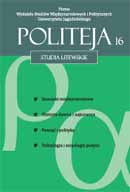Litwa między dwiema totalitarnymi potęgami: doświadczenie (dialektyczne) i pamięć (selektywna)
Lithuania between two totalitarian powers: experience (dialectical) and memory (selective)
Author(s): Nerijus ŠepetysSubject(s): Politics / Political Sciences
Published by: KSIĘGARNIA AKADEMICKA Sp. z o.o.
Summary/Abstract: The article discusses the differences in the content of the collective memory of World War II between the Baltic states’ societies and the rest of Europe (particularly, Western Europe). The author argues that the Baltic countries (in many respects – also Poland) are located “in between”, having Russia and Germany as neighbours. Nowadays, he admits, it is not entirely true in terms of political divisions (all countries are on the borders of the EU), but it is nonetheless reflected in the collective memory of the societies under discussion. The article focuses mostly on Lithuania. The author’s main point is that the Baltic societies survived both totalitarianisms (Nazi and Soviet), while in the West only the national -socialist (fascist) totalitarianism was experienced. As a consequence, the author argues, Sovietism is regarded in the West as the “better” totalitarianism, or not considered totalitarian at all, while in the Baltic states the term “totalitarianism” has always meant the two: Soviet and Nazi, equally reprehensible. As an example of this gap, the author analyzes the case of a discussion between the Latvian minister of foreign affairs – Sandra Kalniete and a Holocaust survivor – Salomon Korn. In the article, integrating the “Baltic memory” into the European memory is postulated. The author argues that it is necessary to acknowledge the existence of two totalitarianisms, both of which equally “brought about genocide, violations of human rights and freedoms, war crimes and crimes against humanity”. In his view, nowadays the integration of European memory has become a political issue. He points out to Russia as the state keenly interested and actively seeking to preserve the image of Sovietism as less totalitarian in the minds of Europeans.
Journal: Politeja - Pismo Wydziału Studiów Międzynarodowych i Politycznych Uniwersytetu Jagiellońskiego
- Issue Year: 8/2011
- Issue No: 16
- Page Range: 265-279
- Page Count: 15
- Language: Polish

